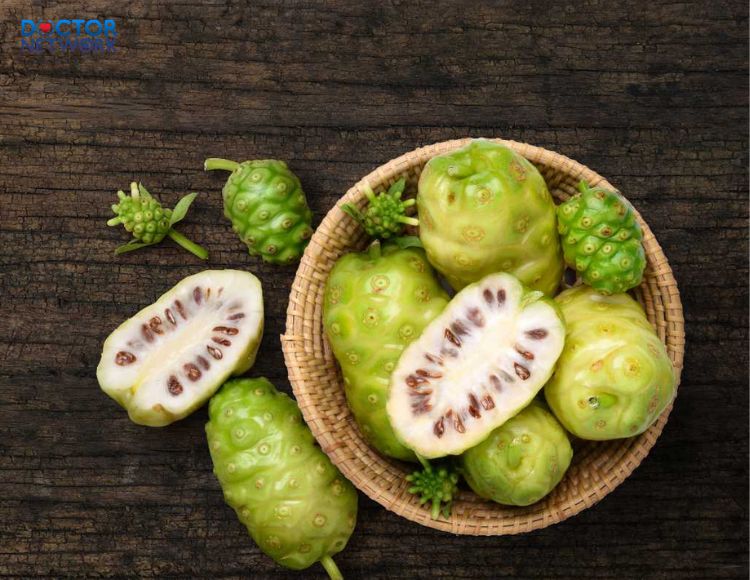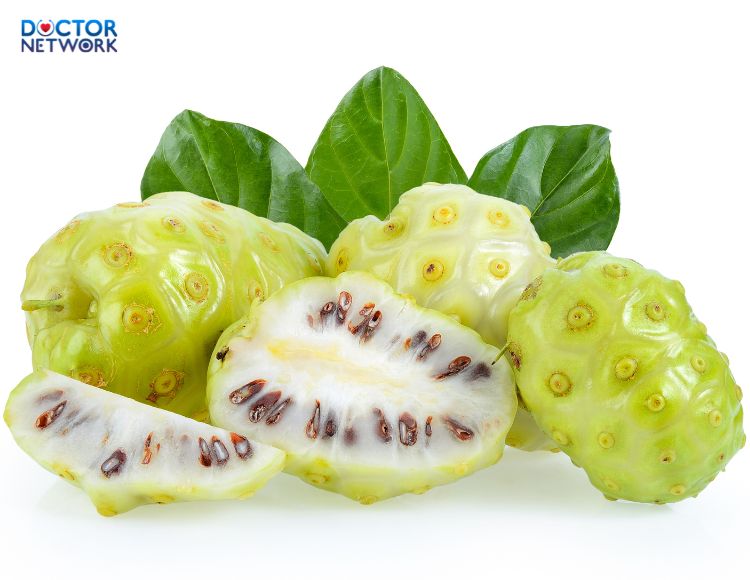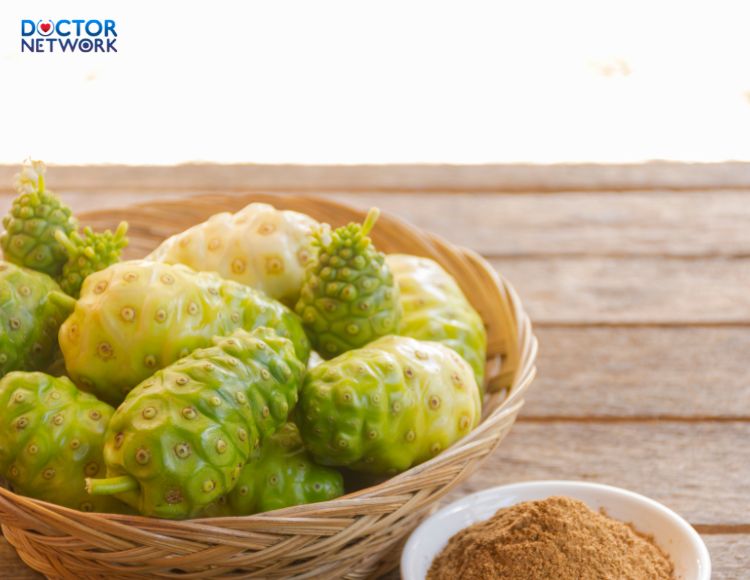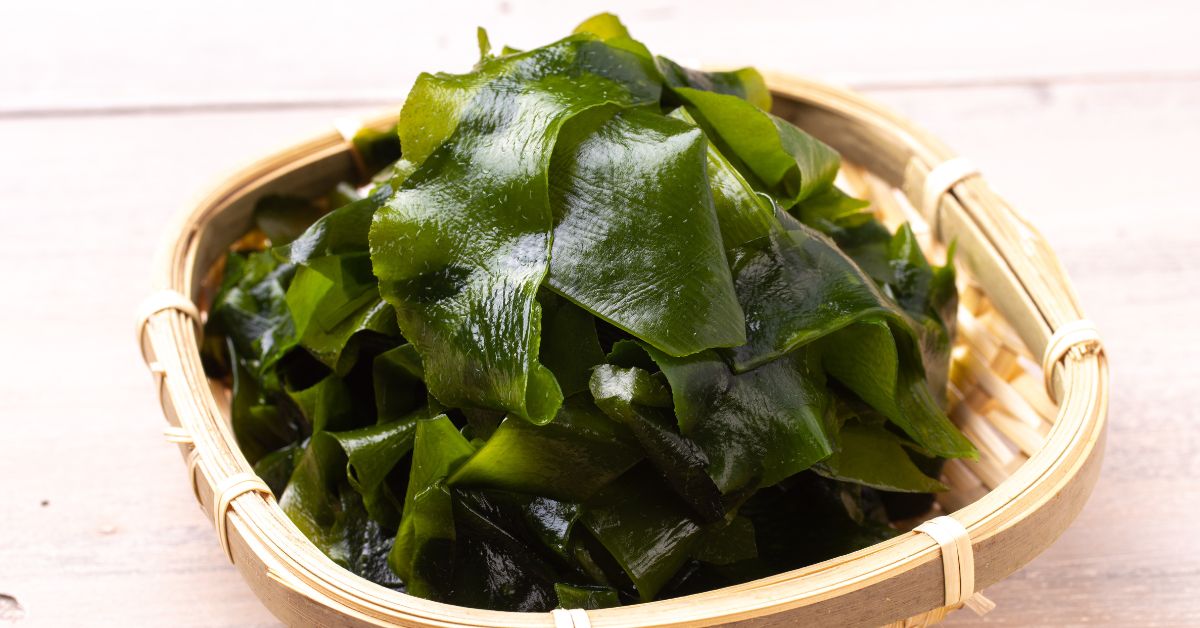Noni fruit, a tropical superfood from the South Pacific, has gained popularity for its potential health-boosting properties. In this article, we will explore what are the benefits of drinking sugar-soaked noni fruit, delving into its origins, potential health advantages, consumption methods, and possible side effects. We’ll also compare it to other noni forms and guide you on where to find this intriguing fruit product.
Introduction to Noni Fruit and Sugar-Soaking
What is Noni Fruit?
Noni fruit, scientifically known as Morinda citrifolia, is a small, bumpy fruit with a pungent odor. Native to Southeast Asia and the Pacific Islands, this fruit has been a staple in traditional medicine for centuries.

Noni fruit (Morinda citrifolia) originates from Southeast Asia and Polynesia.
The History and Traditional Uses of Noni
Polynesian healers have long revered noni for its medicinal properties. They used various parts of the noni plant to treat ailments ranging from digestive issues to skin problems. The fruit’s potent compounds have piqued the interest of modern researchers, leading to numerous studies on its potential health benefits.
What is Sugar-Soaked Noni Fruit?
Sugar-soaked noni is a preparation method that involves immersing ripe noni fruit in sugar or syrup. This process not only preserves the fruit but also makes it more palatable, masking its naturally strong odor and taste.
How is Sugar-Soaked Noni Made?
To create sugar-soaked noni:
- Harvest ripe noni fruits
- Clean and slice the fruits
- Layer the slices with sugar in a container
- Allow the mixture to ferment for several weeks
- Strain and bottle the resulting syrupy liquid
Why is Sugar-Soaked Noni Preferred over Fresh Noni?
Many people prefer sugar-soaked noni due to its improved taste and longer shelf life. The sugar-soaking process mellows the fruit’s strong flavor while potentially preserving its beneficial compounds.
Potential Health Benefits of Sugar-Soaked Noni
Rich in Antioxidants – A Powerful Ally for Health
Sugar-soaked noni is a potent source of antioxidants, including flavonoids and vitamin C. These compounds help combat oxidative stress, potentially reducing the risk of chronic diseases and supporting overall health.
Supports a Healthy Immune System
The immune-boosting properties of noni may be enhanced in its sugar-soaked form. The fruit’s polysaccharides and scopoletin could stimulate immune function, helping the body defend against pathogens.
May Improve Digestive Health
Traditional use of noni for digestive issues may have scientific merit. Sugar-soaked noni could support gut health by promoting beneficial bacteria growth and aiding in nutrient absorption.
Potential Anti-Inflammatory Effects
Compounds in sugar-soaked noni may help reduce inflammation in the body. This anti-inflammatory action could benefit conditions such as arthritis and inflammatory bowel diseases.

Sugar-soaked noni fruit provides many wonderful health benefits
May Have Anti-Cancer Properties
While research is ongoing, preliminary studies suggest that noni compounds may have anti-cancer properties. Sugar-soaked noni could potentially inhibit tumor growth and support conventional cancer treatments.
Can Help Regulate Blood Sugar Levels
Paradoxically, despite its sugar content, noni may help regulate blood glucose. Its bioactive compounds could improve insulin sensitivity, benefiting those with or at risk of diabetes.
Could Aid in Weight Management
Some studies indicate that noni may support weight loss efforts by boosting metabolism and reducing fat accumulation. Sugar-soaked noni, when consumed in moderation, could be part of a balanced weight management plan.
Promotes Healthy Skin and Hair
The nutrient profile of sugar-soaked noni may contribute to skin and hair health. Its antioxidants and vitamins could support collagen production and protect against environmental damage.
May Boost Energy Levels
Consumers often report increased energy after consuming sugar-soaked noni. This effect could be due to its nutrient density and potential impact on cellular energy production.
Potential Benefits to Nervous System Health
Neuroprotective compounds in noni may support brain health. Regular consumption of sugar-soaked noni could potentially improve cognitive function and reduce the risk of neurodegenerative diseases.
May Support Cardiovascular Health
The antioxidants and other bioactive compounds in sugar-soaked noni may promote heart health by reducing cholesterol levels and improving blood pressure regulation.
| Potential Benefit | Key Compounds | Possible Mechanisms |
|---|---|---|
| Antioxidant Action | Flavonoids, Vitamin C | Neutralizes free radicals |
| Immune Support | Polysaccharides, Scopoletin | Stimulates immune cell activity |
| Digestive Health | Enzymes, Fiber | Promotes gut flora balance |
| Anti-Inflammatory | Iridoids, Flavonoids | Reduces inflammatory markers |
| Blood Sugar Regulation | Triterpenes | Improves insulin sensitivity |
How to Consume Sugar-Soaked Noni Fruit
Recommended Dosage and Frequency
While there’s no universally agreed-upon dosage, most experts suggest starting with 1-2 tablespoons of sugar-soaked noni juice daily. Gradually increase intake while monitoring for any adverse effects.
Different Ways to Consume Sugar-Soaked Noni
- Drink it straight
- Mix with water or juice
- Add to smoothies
- Use as a topping for yogurt or oatmeal
- Incorporate into salad dressings
Adding Sugar-Soaked Noni to Your Diet
Start by introducing small amounts of sugar-soaked noni into your daily routine. Consider replacing less nutritious sweet treats with this potentially beneficial alternative.
Combining Sugar-Soaked Noni with Other Foods and Drinks
Experiment with pairing sugar-soaked noni with complementary flavors:
- Tropical fruits like mango or pineapple
- Citrus juices for a tangy twist
- Green tea for an antioxidant boost
- Ginger for added digestive benefits

Sugar-soaked noni fruit is a simple preparation method that helps harness the wonderful benefits of this fruit.
Potential Side Effects of Sugar-Soaked Noni
Allergic Reactions
Some individuals may experience allergic reactions to noni. Watch for symptoms such as itching, rash, or difficulty breathing.
Digestive Issues
High consumption of sugar-soaked noni may cause digestive discomfort in some people. Start with small amounts to assess your tolerance.
Interactions with Medications
Noni may interact with certain medications, particularly those affecting liver function or blood thinners. Consult your healthcare provider before adding sugar-soaked noni to your regimen.
Impact on Blood Sugar Levels
Despite potential benefits for blood sugar regulation, the added sugar in this preparation may affect glucose levels. Diabetics should monitor their blood sugar closely when consuming sugar-soaked noni.
Possible Pregnancy and Breastfeeding Considerations
Pregnant and breastfeeding women should exercise caution and consult their healthcare provider before consuming sugar-soaked noni due to limited research on its safety in these populations.
Sugar-Soaked Noni vs. Other Forms of Noni
| Form | Taste | Convenience | Potential Benefits |
|---|---|---|---|
| Sugar-Soaked | Sweet, palatable | Ready to consume | Preserved nutrients, longer shelf life |
| Fresh | Strong, pungent | Requires preparation | Highest nutrient content, no added sugar |
| Juice | Varies | Convenient | Concentrated nutrients, but may have additives |
| Powder | Neutral | Versatile | Concentrated, long shelf life |
| Supplements | Tasteless | Very convenient | Standardized dosage, but may lack whole food benefits |
Where to Find Sugar-Soaked Noni
- Local health food stores
- Specialty Pacific Island markets
- Online retailers specializing in exotic fruits
- Direct from noni farms in Hawaii or other tropical regions
When purchasing sugar-soaked noni, consider factors such as organic certification, sustainable sourcing, and processing methods to ensure you’re getting a high-quality product.
Frequently Asked Questions about “What are the benefits of drinking sugar-soaked noni fruit?”
Is Sugar-Soaked Noni Good for You?
Sugar-soaked noni can be a beneficial addition to a balanced diet due to its potential antioxidant, immune-supporting, and anti-inflammatory properties. However, the added sugar content should be considered in the context of overall sugar intake.
How Much Sugar-Soaked Noni Should I Consume?
Start with 1-2 tablespoons daily and adjust based on personal tolerance and health goals. It’s best to consult with a healthcare provider for personalized recommendations.
What are the Side Effects of Sugar-Soaked Noni?
Possible side effects include digestive discomfort, allergic reactions, and potential interactions with medications. Monitor your body’s response and discontinue use if adverse effects occur.
Can I Use Sugar-Soaked Noni for My Skin?
While primarily consumed internally, some people apply diluted sugar-soaked noni topically for potential skin benefits. However, it’s advisable to patch test first and consult a dermatologist before using it as a skincare product.
Where Can I Buy Sugar-Soaked Noni?
Sugar-soaked noni can be found in health food stores, specialty markets, and through online retailers. Look for reputable sources that provide information on the noni’s origin and processing methods.
Conclusion
Sugar-soaked noni fruit offers a unique blend of traditional wisdom and modern nutritional potential. Its rich antioxidant profile, coupled with possible benefits for immune function, digestion, and overall health, makes it an intriguing addition to a balanced diet. However, as with any dietary supplement, it’s crucial to approach sugar-soaked noni with informed caution.
Scientific Researches on “What are the benefits of drinking sugar-soaked noni fruit?”
Here are some relevant scientific studies on noni fruit:
- “Noni: A new nutritional supplement” by Wang et al. (2002) in the Journal of Medicinal Food.
- “Antioxidant and DNA protective effects of noni (Morinda citrifolia L.) juice” by Mohd Zin et al. (2006) in Asia Pacific Journal of Clinical Nutrition.
- “Anticancer activity of Morinda citrifolia (Noni) fruit: A review” by Brown (2012) in Phytotherapy Research.
- “Morinda citrifolia (Noni): A comprehensive review on its industrial uses, pharmacological activities, and clinical trials” by Abou Assi et al. (2017) in Arabian Journal of Chemistry.
References:
What are the effects of drinking noni fruit juice? – Vietnam.vnvietnam·1
Side Effects of Drinking Noni Juice: What You Need to Know – Starters Kitchenstarterskitchen·2
Kiểm Duyệt Nội Dung
More than 10 years of marketing communications experience in the medical and health field.
Successfully deployed marketing communication activities, content development and social networking channels for hospital partners, clinics, doctors and medical professionals across the country.
More than 6 years of experience in organizing and producing leading prestigious medical programs in Vietnam, in collaboration with Ho Chi Minh City Television (HTV). Typical programs include Nhật Ký Blouse Trắng, Bác Sĩ Nói Gì, Alo Bác Sĩ Nghe, Nhật Ký Hạnh Phúc, Vui Khỏe Cùng Con, Bác Sỹ Mẹ, v.v.
Comprehensive cooperation with hundreds of hospitals and clinics, thousands of doctors and medical experts to join hands in building a medical content and service platform on the Doctor Network application.

























